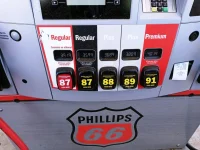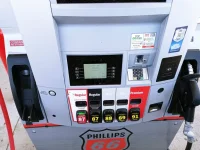Use Costco with confidence ...Use SHELL with confidence,Use Chevron with confidence.
You are using an out of date browser. It may not display this or other websites correctly.
You should upgrade or use an alternative browser.
You should upgrade or use an alternative browser.
Friend and I were discussing gasoline last night.
- Thread starter aquariuscsm
- Start date
A couple related threads:
https://bobistheoilguy.com/forums/t...wik-trip-what-additive-to-use-instead.349538/
https://bobistheoilguy.com/forums/threads/top-tier-gasoline-gone.352003/
I don't think one could answer the question without knowing exactly which additive and how much is in the fuel you're buying. They may already exceed EPA requirements as it is.
By its nature, meeting Top Tier requirements will mean meeting EPA minimum. I think they specify the same tests (or substantially similar tests), but with a lower limit for deposits.
And of course it's not some snake oil. The main impetus for this wasn't fuel marketer but automakers who were having owners come back complaining of drivability issues, even with EPA minimum fuels. Still - I'm not sure what the deal would be when mixing and matching different detergents, whether it's a load from Costco getting the EPA minimum, then another shot at the station with their proprietary additive, mixing different Top Tier fuels with different additives, or even mixing and matching by using an aftermarket additive. What's that called - the Law of Unintended Consequences? What if there's some incompatibility that makes it worse? It's about motor oil, but I remember hearing about a case where two 5W-30 motor oils were mixed and the outcome was something like 10W-40 because of the way that the additives interacted with each other.
- Joined
- Nov 13, 2020
- Messages
- 300
Only place I get gas for my daily driver.Costco here still proudly proclaiming Top Tier both onsite and on the website.
EVERY gasoline has to meet “EPA minimum”…so why are they all not “top tier”?By its nature, meeting Top Tier requirements will mean meeting EPA minimum. I think they specify the same tests (or substantially similar tests), but with a lower limit for deposits.
Top Tier gas has detergent levels and abilities ABOVE the minimum EPA requirements. At least that’s what they claim makes ‘em “special”!
EVERY gasoline has to meet “EPA minimum”…so why are they all not “top tier”?
Top Tier gas has detergent levels and abilities ABOVE the minimum EPA requirements. At least that’s what they claim makes ‘em “special”!
The premise would be that the Top Tier requirements could conceivably be different than the EPA's standards as outlined in the Code of Federal Regulations. But still - everything out there is required to meet at least the EPA mandated minimum.
Top Tier kinda follows the more is better train of thought.
The licensing of it is kinda like the Dexos thing.
The licensing of it is kinda like the Dexos thing.
Found a label on a pump saying TT still. Was excited to see pure fuel under 4.00 so I bought it. Kinda gave up for the most part worrying if it's TT or not. Been canning vegetables and storing up on rice. Told my dad about TT gas and he told me to not get attached as I refill three times a week so the fuel isn't going bad to start with in that short of time.
Attachments
For 12% higher cost, I'd stick with E10, there's almost no benefit to use ethanol free gas in a modern fuel injected vehicle over E10 especially if it costs significantly more.
There's no such thing additive incompatibility with regards to gasoline.By its nature, meeting Top Tier requirements will mean meeting EPA minimum. I think they specify the same tests (or substantially similar tests), but with a lower limit for deposits.
And of course it's not some snake oil. The main impetus for this wasn't fuel marketer but automakers who were having owners come back complaining of drivability issues, even with EPA minimum fuels. Still - I'm not sure what the deal would be when mixing and matching different detergents, whether it's a load from Costco getting the EPA minimum, then another shot at the station with their proprietary additive, mixing different Top Tier fuels with different additives, or even mixing and matching by using an aftermarket additive. What's that called - the Law of Unintended Consequences? What if there's some incompatibility that makes it worse? It's about motor oil, but I remember hearing about a case where two 5W-30 motor oils were mixed and the outcome was something like 10W-40 because of the way that the additives interacted with each other.
There's no such thing additive incompatibility with regards to gasoline.
Perhaps not in any way where it's like two different types of VI improver going haywire, but possibly where the detergent effectiveness of half with additive A and half with additive B isn't as effective as just A or B. I kind of wondered about what Costco does, which is add sometime on top of (what's likely) a generic additive from the fuel terminal at the station, unless they somehow have their proprietary additive added at the terminal. Of course that makes no sense - otherwise it would make more sense to just have all of it added there.
Is it true that no gasoline can leave the terminal without the minimum amount of additives?Perhaps not in any way where it's like two different types of VI improver going haywire, but possibly where the detergent effectiveness of half with additive A and half with additive B isn't as effective as just A or B. I kind of wondered about what Costco does, which is add sometime on top of (what's likely) a generic additive from the fuel terminal at the station, unless they somehow have their proprietary additive added at the terminal. Of course that makes no sense - otherwise it would make more sense to just have all of it added there.
https://bobistheoilguy.com/forums/t...stco-gas-additives.350836/page-2#post-6015588
Is it true that no gasoline can leave the terminal without the minimum amount of additives?
https://bobistheoilguy.com/forums/t...stco-gas-additives.350836/page-2#post-6015588
Yes. I found one of those PowerPoint presentations by Costco that hinted that the dose they give at the station is additional. I do kind of worry about how well it's mixed because customers are pumping gas while deliveries are going on, but if it's dosed first at the terminal, there's no risk that the detergent concentration is less than EPA minimums.
But it's in the CFR. It's a requirement before it's transferred. The general assumption is that it can't leave the terminal (i.e. be "transferred") without it. The transportation company is just the agent, and I believe the gas station technically owns it once it goes into a tanker.
https://www.govinfo.gov/content/pkg/CFR-2010-title40-vol16/pdf/CFR-2010-title40-vol16-sec80-161.pdf
(iii) Gasoline may not be sold or transferred to a party who sells or transfers gasoline to the ultimate consumer unless such gasoline contains detergent additives which have been certified according to the requirements of this section.
Still awaiting all of the posters who destroyed their cars engine strictly because of the use of non-top tier gasoline. Then I will believe.
Still awaiting all of the posters who destroyed their cars engine strictly because of the use of non-top tier gasoline. Then I will believe.
I don't think "destroying" is the issue. It would be more about long-term engine performance. The EPA minimum was a good first step, but automakers were the ones who had the idea for Top Tier. They were seeing customers coming to them with engine performance issues, even with the EPA minimum detergent concentration.
Agreed - if there's no Chevron nearby, Shell is a good option because they've had no problems with Motiva supplying their additives as far as I know.Use SHELL with confidence,
Agreed - if there's no Chevron nearby, Shell is a good option because they've had no problems with Motiva supplying their additives as far as I know.
Are they the supplier? They're not listed. It's kind of odd because it would have to be on the EPA list, but there's often no way of knowing who gets what. There are some assumptions made that Chevron has its own additives as does Sunoco. Other than that, there aren't really too many oil companies that manufacture their own additives. BASF makes BP/Amoco's "Invigorate" additive and that's the name on the EPA website. Infineum (joint venture of Shell and XOM) used to have a single additive, although it wasn't a given that Shell or XOM used it.
As far as I can tell, Motiva is just a distributor now.
https://www3.epa.gov/otaq/fuels1/ffars/web-detrg.htm
Similar threads
- Replies
- 56
- Views
- 19K
- Replies
- 6
- Views
- 5K
- Sticky
- Replies
- 1
- Views
- 3K
- Replies
- 28
- Views
- 3K
- Replies
- 61
- Views
- 63K



